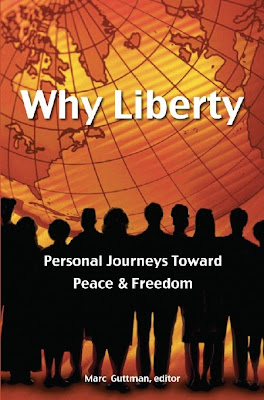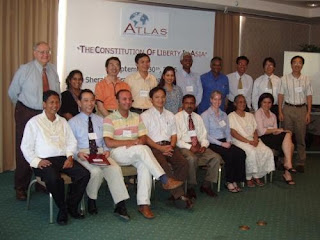I received this warm, friendly and well-written farewell letter today from Rainer Adam. I have met him first time -- along with many Friedrich Naumann Foundation for Freedom (FNF) officials, Asian free marketers and friends -- in 2004, 10 years ago in Hong Kong, for the Economic Freedom Network (EFN) Asia conference. After that, I would meet him yearly except in 2007 and 2009, for the annual EFN conferences or some FNF major events here in Manila.
Cool guy, always smiling. When I first met him in 2004, I immediately thought that he looked like Eric Clapton, among my favorite rock stars.
I am very thankful to Dr. Jo Kwong, the former Vice President of Atlas Economic Research Foundation, for bringing me to the EFN conferences in 2004 to 2006, even if Minimal Government was still not a member of the network. We became EFN member only in 2009 I think. If Jo did not bring me to the 2004-2006 conferences, Minimal Government may not have been part of the EFN and the Asian free market network, I don't know.
Rainer, good work. No. Rather, excellent work.
Siggi, expect the same support and friendship from us.
It's all about Freedom. And free trade, rule of law, personal responsibility and limited government.
PS: the above photo, plus another one below, I got from Rainer's fb wall.
------------
Bangkok, 17.06.2014
To all FNF partners,
Dear friends, partners and Asian
liberals,
Some of you already know that this year
in June my term as the Regional Director for Southeast and East Asia of the
Friedrich-Naumann-Foundation for Freedom will come to an end. After six years in
Thailand and over 26 years of living and working in Asia, the time has come for
me to say goodbye to you.
From September onwards I will take up my
new position as FNF Regional Director for Central-Southern- and Eastern Europe
in Sofia, Bulgaria. The place may be a different one; however, the goal stays
the same: to promote freedom, liberal values, human rights, free trade,
democracy and the rule of law.
I would like to take this opportunity to
express my appreciation and gratitude for your support, friendship and
cooperation during the last six years. Without your help the Foundation would
not be where it is today, a trusted member of the Asian freedom community.
During my time in the region, I had the
good fortune to witness many exciting developments. Let me share some of them
with you:
* A major highlight of 2010 was the
election victory of the Philippine Liberal Party (LP). Together with a
delegation of the Foundation, I had the chance to witness President Noynoy Aquino’s
celebratory inauguration in Manila. President Aquino kept his campaign
promises. Today, the Philippines shows significant economic growth and a
reduction in poverty. The government is fighting corruption and promoting
people centred development.
* 2010 also marked the beginning of
Myanmar´s journey towards democracy. After years of military dictatorship,
President Thein Sein implemented a number of remarkable reforms: most political
prisoners were released, opposition parties can participate in politics,
markets opened up and the population enjoys a whole new set of civil liberties.
The Foundation has supported democratic developments in the country for many
years. Therefore, the opening of the FNF office in Yangon in 2013 was a natural
development and a special milestone in our work, marking our long-term
commitment to promoting freedom, human rights and the rule of law in the
country.
* Myanmar was not the only office
opening I witnessed. One year before, in 2012, the doors to the new FNF Vietnam
office were opened in Hanoi. Philipp Rösler, at that time German vice-chancellor
and minister for economy, gave the inaugural speech and honoured us with his
presence.
* Liberal forces become increasingly
visible in our region. In 2011, the Liberal International (LI) Congress in
Manila was the first time this important gathering of Liberals from all over the
world was held in an Asian country. Manila is also the home base of the
regional network of Asian liberal parties, the Council of Asian Liberals and
Democrats (CALD). The network is constantly growing. In 2012, the Mongolian
Civil Will and Green Party was accepted as the 10th member party.
* Our regional partner in the promotion
of human rights, a field of utmost importance to us liberals, the Regional
Working Group for an ASEAN Human Rights Mechanism (RWG), has made good progress
in its advocacy work.
* The Economic Freedom Network Asia
(EFN) was able to hold annual conferences to discuss important topics of
economic freedom, and bring political decision-makers and analysts together to
foster better mutual understanding of the benefits of free trade, economic
growth and free markets.
* Furthermore, I am proud that some of
our programs – namely It’s all about freedom (Philippines), Dream Thailand and
SIM Democracy (both from Thailand) – were included in the best practice manual
of the Council for a Community of Democracies.
* Our Freedom Barometer Asia has become
a well-established analytical framework and tool to measure freedom in the
region and to stimulate debate and conversations about concrete policies
increasing personal liberty and individual responsibility.














